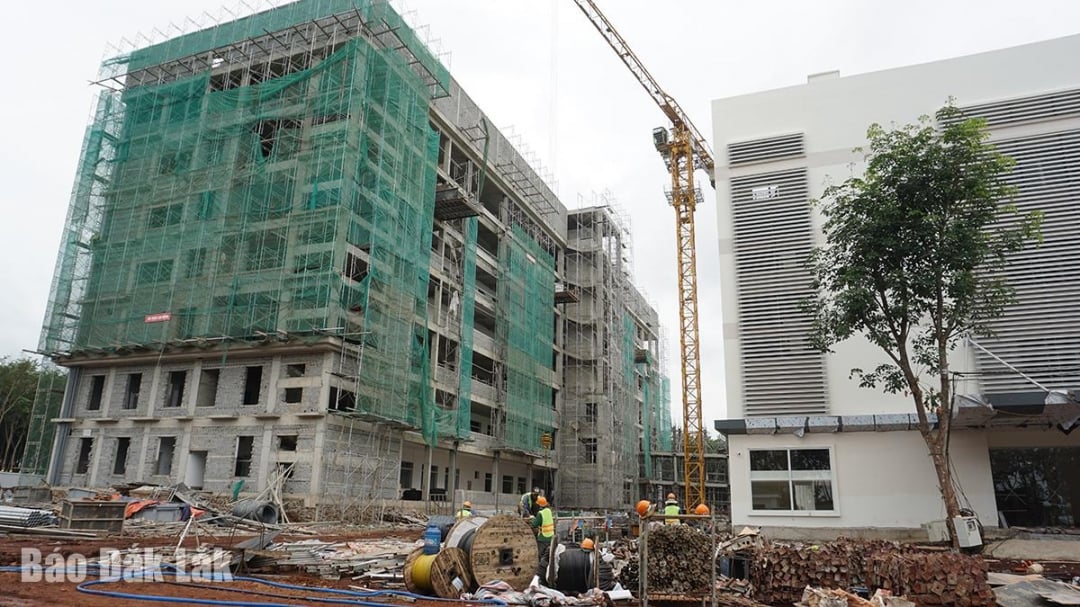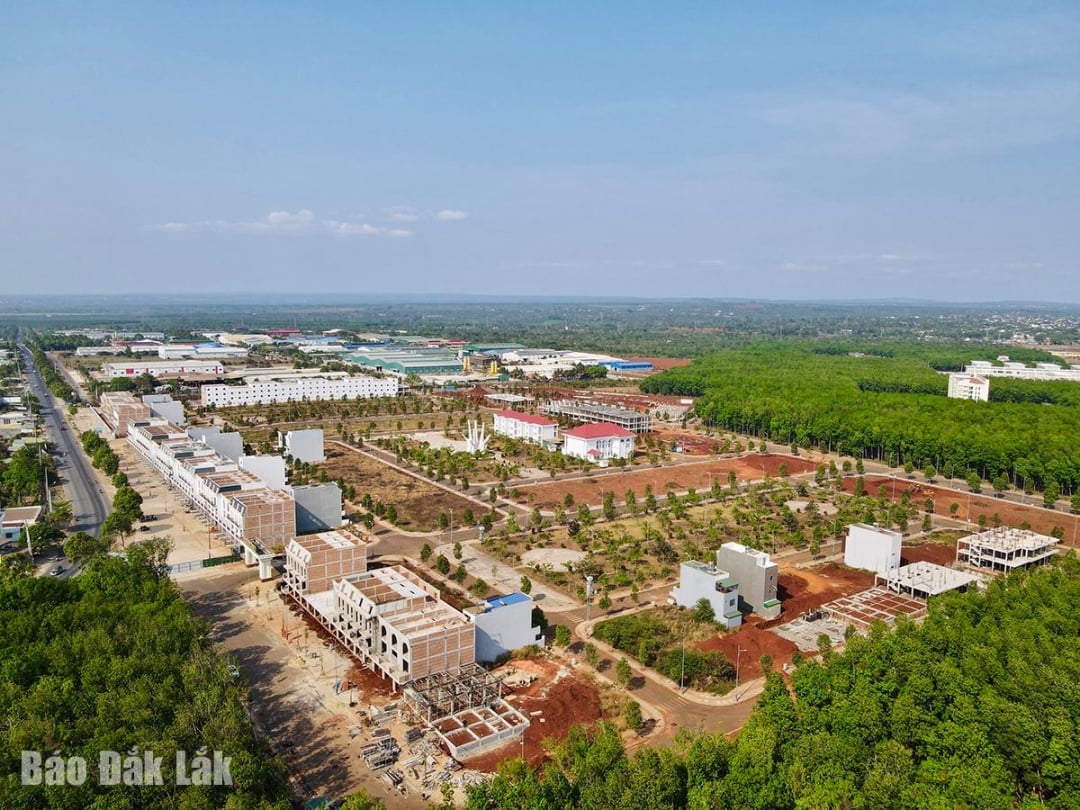At the end of May 2025, the Prime Minister issued a telegram directing the Ministry of Construction to review and drastically reduce administrative procedures, including construction permit procedures. So, is the abolition of construction permits really a "win-win" as many opinions say, or are there still "difficulties" that need to be resolved?
On the positive side, the abolition of construction permits is expected to bring practical benefits to people, businesses and management agencies. Because currently the process of applying for a construction permit is time-consuming and costly, directly affecting the progress and investment resources. This reduction in procedures will help people save a significant amount of time (instead of waiting 15-30 days, or even months) and be more proactive in implementing construction projects.
A project built from public investment capital in Buon Ma Thuot ward. |
For businesses, especially in the real estate sector, reducing administrative burdens will accelerate project implementation, optimize operations, bring products to market at the right time and use resources more efficiently. Shortening procedures will contribute to improving the investment environment and promoting legal supply to the market. This is especially true for projects with detailed 1/500 planning or in areas with approved urban design, where technical indicators have been clearly defined, allowing the application of a construction registration mechanism instead of traditional licensing.
Not only that, eliminating construction permits also helps management agencies save time and human resources. Instead of focusing on complicated pre-inspection work, local authorities can switch to post-inspection at the completion stage, considering this an effective "blockade" to ensure construction order. This helps the administrative apparatus become more streamlined, focusing on quality management and urban planning.
Despite the many benefits, abolishing construction permits is not an easy decision and requires careful preparation. Deputy Minister of Construction Nguyen Danh Huy said that the review and implementation process must be extremely careful, with a comprehensive impact assessment to avoid negative consequences. One of the biggest challenges is ensuring quality control and construction order when switching from pre-inspection to post-inspection. Without a strong, synchronous and transparent management system, abolishing permits can lead to construction that is not planned, exceeds floors, encroaches on boundaries, etc., causing complex problems in urban management.
People can also face legal risks if they carry out construction without understanding technical regulations, boundaries, height, or if it is not in accordance with land use planning. The consequences can be administrative sanctions, forced construction, or even having to dismantle the entire project after inspection, causing great financial and mental losses.
Another challenge is the management of construction in long-standing residential areas, especially in deep alleys. With crowded streets and plots of land being combined and consolidated, management will be extremely complicated if there is no close supervision from the beginning. The possibility of implementing the removal of permits deep into long-standing alleys in urban areas will face many inadequacies and variables, easily causing many negative consequences that must be dealt with later.
An urban area project is being implemented in Buon Ma Thuot ward. |
In order for the abolition of construction permits to be truly effective, experts recommend that it should be implemented in a controlled manner, avoiding mass implementation. In the immediate future, the pilot should be applied to projects that have 1/500 planning, construction designs approved by competent authorities, or in industrial parks and new urban areas with complete legal infrastructure systems.
The recent moves by the People's Committee of Ho Chi Minh City and the People's Committee of Dong Nai Province to consider allowing people to register for construction and pilot the abolition of construction permits in Bien Hoa City (old) and Long Khanh City (old) show a positive and cautious direction. At the same time, investing in improving the post-audit capacity of local authorities is extremely important.
This includes digitizing all planning and construction data; establishing strict sanctions and making the inspection and supervision process transparent. Only when there is a strong and synchronous management system can the abolition of construction permits truly contribute to creating a favorable, transparent and sustainable investment environment for the Vietnamese construction industry.
The abolition of construction permits is a strong step forward, demonstrating innovative thinking in state management. However, to realize the expected benefits and overcome potential challenges, close and synchronous coordination between levels and sectors is needed, along with thorough preparation in terms of institutions, human resources and technology. Only then can we turn “difficulties” into “smartness”, paving the way for a more developed, flexible and effective construction future.
Kha Le
Source: https://baodaklak.vn/tin-noi-bat/202507/bai-bo-giay-phep-xay-dung-can-xay-dung-he-thong-quan-ly-dong-bo-va-hieu-qua-2e31ea3/










































![[Photo] Worshiping the Tuyet Son statue - a nearly 400-year-old treasure at Keo Pagoda](/_next/image?url=https%3A%2F%2Fvphoto.vietnam.vn%2Fthumb%2F1200x675%2Fvietnam%2Fresource%2FIMAGE%2F2025%2F12%2F02%2F1764679323086_ndo_br_tempimageomw0hi-4884-jpg.webp&w=3840&q=75)
![[Photo] Parade to celebrate the 50th anniversary of Laos' National Day](/_next/image?url=https%3A%2F%2Fvphoto.vietnam.vn%2Fthumb%2F1200x675%2Fvietnam%2Fresource%2FIMAGE%2F2025%2F12%2F02%2F1764691918289_ndo_br_0-jpg.webp&w=3840&q=75)








































































Comment (0)